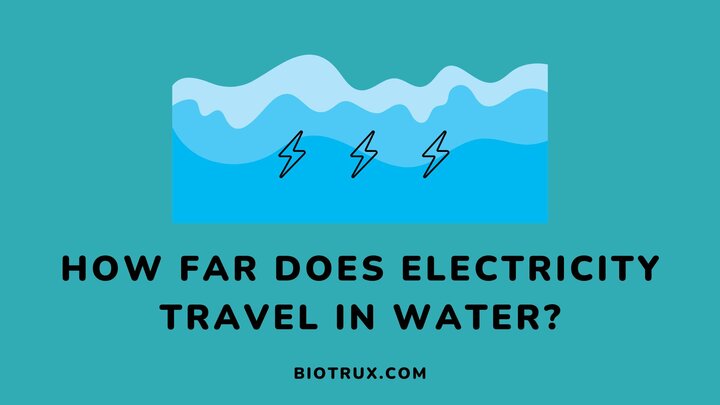Water is not a good conductor of electricity. However, when mineral, salt, or tap water comes in contact with frayed edges or naked wire, its charged state can electrify you upon contact. Understanding how far electric charges travel in water will help you stay safe in this scenario.
Also, there is no definite quantification for how far electricity travels in water. However, factors that matter include proximity, temperature, and type of water. When you are too close to an electrified water body, you risk severe electrocution or death, and vice versa.
This guide will help you understand what happens when electricity travels in water, the factors affecting its speed, and how to test it for electricity.
What Happens When Electricity Travels in Water?

To a layman, the water becomes electrified when the electricity comes in contact with it. This is true, but there is more. Chemically, electricity inside water dissociates the solvent into hydrogen and oxygen.
Hydrogen moves toward the positive pole while oxygen clings to the negative terminal. This dissociation is visible in the form of bubbles. Hence, if water displays bubbles without being heated or applying any force, such water might contain electricity.
Factors Affecting the Speed of Electricity in Water
Several factors determine how far electricity should travel in the water. They include:
1. Type of water
There are two types of water: pure and regular table water (tap water or rainwater). The difference between pure and regular water is that the latter contains more impurities like minerals and other natural chemicals.
Therefore, regular (or impure) water conducts electricity faster than pure water. This is due to the abundant number of ions naturally present in them. Purified or distilled water, on the other hand, contains little to no impurities or external minerals.
They do not allow electricity to travel quickly. For this type of water to experience significant conduction or allow electricity to travel faster, salt or other minerals must be introduced.
Electricity travels faster in impure water than in pure or distilled water.
2. Distance from point of contact
Also, when water contains electric current, how fast it travels to reach the human body upon contact depends on proximity. Hence, the closer you are to an electrified water, the faster the electricity will travel when you make contact and vice versa.
3. Temperature
Temperature also affects how fast molecules move around in the water. The warmer the water, the faster the electricity spreads, and vice versa.
How to Test Electrified Water
Electrical experts should handle testing water for electricity in aquariums or pools. This is because they are better familiar with safety distances and the various devices to execute the process successfully.
Alternatively, there is Shock Alert; a device designed to notify of the presence of electricity in the water. Once this device comes in contact with water, it gives off either a red or a green flash.
A beep and a red flash indicate the presence of voltage in the water while a green flash indicates otherwise. Below is a video that perfectly demonstrates how to use the device:
FAQs
How do you know if there is electricity in the water?
One of the best ways to know if there is electricity in water is to use a shock alert to test for voltage.
This device will turn ‘red’ if there is voltage but turns ‘green’ without voltage.
What happens if a live wire touches water?
When water comes in contact with electricity, shocks, short circuits, or fire can ensue.
Unlike regular fires, electrical fires are devastating and difficult to put out.
What is electricity in water called?
Electricity in water is called hydropower, hydro-energy, or hydroelectric power.
It is a form of renewable energy that uses water stored in dams to generate electricity.
Conclusion
Water might not be the most excellent conductor of electricity. Nevertheless, it is still capable of doing a decent job. This is the case, especially when they contain impurities like salts and other minerals.
Electricity travels faster in rainwater or taps water and at high temperatures. Also, when a body is near electrified water, the electrocution will be severe and may result in death.
If your water keeps displaying bubbles without being under any influence or you wish to know the electric potential of your pool, please call a certified electrical professional.
I hope you found this guide helpful. To better understand the relationship between water and electricity, please see my guide on if pure water conducts electricity.
Thanks for reading.

